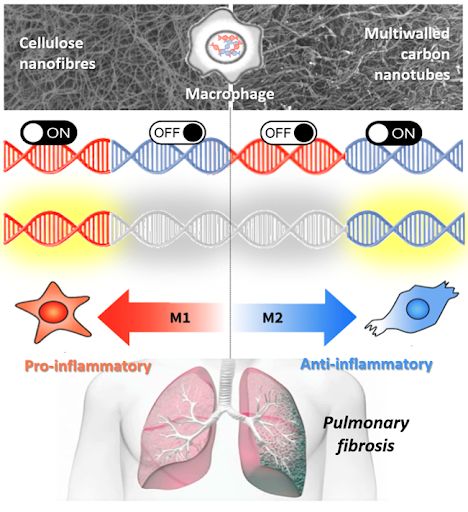The presentation "Epigenetic mechanisms of macrophage polarization induced by nanofibres" will be introduced by Dr. Táňa Závodná from Institute of Experimental Medicine, Department of Genetic Toxicology and Epigenetics.
The 24st NARECOM will take place on Wednesday, March 15, 2023, at 2:30. p.m.
Join Zoom Meeting https://cesnet.zoom.us/j/98639416613
Abstract:
Fibrous nanomaterials have enormous application potential, their resemblance to asbestos might, however, hinder their broader use. Nanofibres represent a wide range of different materials with different physicochemical and biological properties and behavior. It is, therefore, crucial to understand underlying mechanisms of their possible toxicity and assign them to specific types of nanofibres. In the present in vitro study, we investigated mechanisms of the effects of nanocellulose (NC) and multi-walled carbon nanotubes (MWCNT) towards macrophages. Macrophages are immune cells, residing in most body tissues and acting as the first line of defense. As such, they are among the most important cell types interacting with inhaled nanomaterials in the lungs and directing their fate in the exposed organism. Although both NC and MWCNT form long, thin, solid fibers, the response of macrophages to incubation with these substances differs. NC directed macrophages towards a pro-inflammatory M1 response, MWCNT contrarily towards an anti-inflammatory M2 phenotype. Through a series of experiments on cultures of mouse macrophages, it was found that the tubes trigger changes that affect gene activity, specifically altering the production of histone-modifying enzymes (proteins that hold DNA strands in an inactive state), DNA methylating enzymes (blocking the transcription of genes in a given DNA region), and the production of microRNAs (short RNA molecules that prevent the translation of the corresponding DNA strands through mRNA into proteins). These results indicate the importance of epigenetic changes in macrophage polarization induced by nanofibers. Excessive and prolonged polarization towards M2 response by MWCNT might lead to lung fibrosis manifested as tissue scaring and loss of function.
